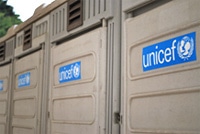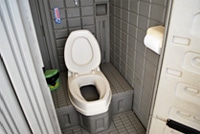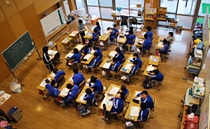



[TOKYO, Japan, 13 May 2011]
 |
 |
| © Japan Committee for UNICEF /2011/K.Goto |
| Temporary toilet provided by the Japan Committee for UNICEF. |
Due to the accident at Fukushima Daiichi Nuclear Power Station, Minamisoma City in Fukushima Prefecture has been designated as an evacuation zone (inside the 20-kilometer no-entry zone) while people outside of the 20-kilometer evacuation zone are being asked to remain indoors (those living between 20 to 30 kilometers from the nuclear power station). As a result countless children living in the city have been put into a tremendously difficult situation. Due to the disaster and nuclear power station accident, the 22 primary schools of Minamisoma City have been combined to form a total of four primary schools. The Japan Committee for UNICEF (JCU) has provided 20 temporary toilets to these primary schools, which had suffered from a severe lack of toilets due to the sudden influx of students.
On 12 May, six toilets were installed at Yasawa Primary School, one of the four consolidated primary schools in Minamisoma City. Before the earthquake this school had between 120 and 130 students, but now, as it accommodates for students from five primary schools in the area, the student population has risen nearly three-fold to 305 children. The school was originally built to support a capacity of around 100 children, so the number of toilets at the school could not provide for large influx.
All of the toilets installed are working flushable toilets. The previous temporary toilets were non-flushing toilets, and some of the children had complained about the foul smell. After the installation of the new toilets, however, children told us that, “I am so happy we got new toilets!” and “I used to hold off going to the bathroom because I didn’t want to use the older toilets, but I have no problem with the new flushing toilets.” One child added, “It would be even better if they were mechanical toilets.”
 |
| © Japan Committee for UNICEF /2011/K.Goto |
The school’s principal, Satoshi Kanada, expressed his gratitude to JCU, commenting, “The school building’s toilets were packed with people and there was no free space. I am very grateful that JCU has supplied us with enough toilets to accommodate for our large number of students—three toilets for boys and three for girls.” He continued, “If we are unable to hold athletic and other events in the school field, we will have to use the gymnasium. These toilets were installed between the gymnasium and school building, so they are very easy to access.”
Commissioned by JCU, Kenji Goto has been covering the situation on-site in the Tohoku region. Mr. Goto said, “I was relieved to see that the children seem happy. But there are still places where roads remain cracked due to the earthquake, so it is impossible to drive after dark. You don’t see anyone outside after it gets dark, and that goes for parks, preschools and primary schools. The living environment has completely changed and the children living here are under a significant amount of stress. Minamisoma City is still in need of a great amount of assistance even compared to other areas that suffered from the disaster.”
In addition to the toilets, Yasawa Primary School also uses moveable blackboards and lockers provided by JCU. Principal Kanada told us that the moveable blackboards were particularly appreciated as classes are being held in the hallways and multi-purpose halls.
This month JCU plans to start the “Let’s Play! The Outdoors Playtime Project”, part of the UNICEF Children’s Bus Fieldtrips initiative, for children in Fukushima Prefecture that are unable to play outside. Under this project, children from preschools and kindergartens in Fukushima City are invited to locations where they can enjoy playing safely. See here for more information.
The Great East Japan Earthquake caused extensive damage in the Tohoku and other regions. Even today a vast number of children still live amidst stern circumstances. JCU will continue to implement assistance in accordance with the needs of the disaster area.
| Receiving Prefecture |
Type of Emergency Supplies |
Arrival Date |
Quantity | Donating Company |
Comments |
|---|---|---|---|---|---|
| Miyagi | Water | 19 Mar. | 12,288 bottles |
VanaH Co., Ltd. | Two-liter plastic bottles |
| Fukushima | Water | 22 Mar. | 12,672 bottles |
VanaH Co., Ltd. | Two-liter plastic bottles |
| Miyagi | Underwear for boys and girls | 22 Mar. | 200,000 | ||
| Iwate | Underwear for boys and girls | 23 Mar. | 30,000 | ||
| Fukushima | Water | 23 Mar. | 4,680 bottles |
KIRIN MC DANONE WATERS Co., Ltd. | Two-liter plastic bottles |
| Miyagi | Children’s shoes | 23 Mar. | 10,000 pairs |
||
| Miyagi | Children’s diapers | 24 Mar. | 80 packs | P&G Japan | |
| Iwate | Children’s underwear | 24 Mar. | 9,700 | ||
| Fukushima | Water | 24 Mar. | 12,288 bottles |
VanaH Co., Ltd. | Two-liter plastic bottles |
| Iwate | Shoes | 26 Mar | 1,404 pairs | Achilles Corporation | |
| Iwate | Underwear for boys and girls | 27 Mar. | 28,266 | ||
| Iwate | Boots | 27 Mar. | 7,462 pairs | ||
| Iwate | Wipes | 28 Mar. | 1,200 | P&G Japan | For babies |
| Miyagi | Recreation kits Early Childhood Development kits |
2 Apr. | 50 of each | Procured from the UNICEF Supply Division | |
| Iwate | Recreation kits Early Childhood Development kits |
2 Apr. | 50 of each | Procured from the UNICEF Supply Division | |
| Miyagi | Book bags | 6 Apr. | 70 | Nihon New Bag Chain | |
| Iwate | Book bags | 6-7 Apr. | 340 | Seiban | |
| Miyagi | Schoolbags | 8 Apr. | 18,000 | Procured from the UNICEF Supply Division | |
| Iwate | Schoolbags | 8 Apr. | 18,000 | Procured from the UNICEF Supply Division | |
| Miyagi | Personal security buzzers (for crime prevention purposes) | 8 Apr. | 5,000 | ||
| Iwate | Personal security buzzers (for crime prevention purposes) | 8 Apr. | 5,000 | ||
| Miyagi | Minicar | 8 Apr. | 3 cars | ||
| Fukushima | Water | 11 Apr. | 1,536 bottles | VanaH Co., Ltd. | Two-liter plastic bottles |
| Miyagi | Replenishments for recreation kits | 12 Apr. | 60 sets | ||
| Miyagi | Miniature toy cars | 12 Apr. | Approx. 1,200 | TAKARA TOMY | |
| Sagamihara* | Water | 12 Apr. | 12,288 bottles | VanaH Co., Ltd. | Two-liter plastic bottles |
| Miyagi | Play mats | 13 Apr. | Two types; 80 of each type | IKEA | |
| Miyagi | Drawing sets | 13 Apr. | 60 sets | IKEA | |
| Iwate | Preschool-size chairs, tables and low tables | 14 Apr. | 75 chairs; 11 tables; 9 low tables | Donated to preschools, primary schools, junior high schools and high schools in the disaster area as well as their new locations | |
| Miyagi | Mopeds | 15 Apr. | 5 | ||
| Iwate | Notebooks and stationery sets for primary and junior high school students | 15. Apr. | 16,700 sets | ||
| Miyagi | 183 computers; 57 copiers and fax machines; 61 printers | 18-21 Apr. | Distributed to preschools, primary schools, junior high schools and high schools in the disaster area as well as their new locations | ||
| Fukushima | Movable blackboards | 21 Apr. | 10 | ||
| Fukushima | Temporary toilets | 21 Apr. | 20 |
Number of UNICEF Children’s Mini Libraries distributed: Approximately 250 (as of 28 April 2011)
*Areas receiving disaster victims.
*In certain cases some supplies may be taken from prefectural supply storage warehouses and distributed to shelters and disaster sites in other prefectures.
As of 9:00 a.m. on 28 April 2011 (compiled by the Information and Public Affairs Division).